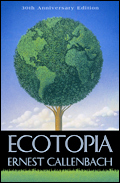In the afterword to the 30th-anniversary edition of his 1975 novel, Ernest Callenbach writes, “Looking back, it seems clear that Ecotopia was the first attempt to portray a sustainable society, and that this, more than its modest literary merit, explains its durability.” Sadly, there is no false humility in that statement.
Ecotopia (30th Anniversary Edition) by Ernest Callenbach, Heyday Books, 176 pgs., 2005.
Ecotopia is ostensibly about a secessionist Northwest — northern California, Oregon, and Washington — founded on ecological principles. In this independent land, cars are abolished, everybody recycles, and sewage is turned to fertilizer. More fundamentally, Ecotopia is a “stable-state” society, where old notions of economic progress are retired and “biological stasis” becomes the ultimate goal. That sounds good, as far as it goes; however, the vision is weighed down by so much extraneous cultural baggage — Marxism, paganism, free love, ritual warfare, communal living, abortion on demand, legalized drugs, gamelan orchestras — that readers coming to Ecotopia for the first time... Read more
